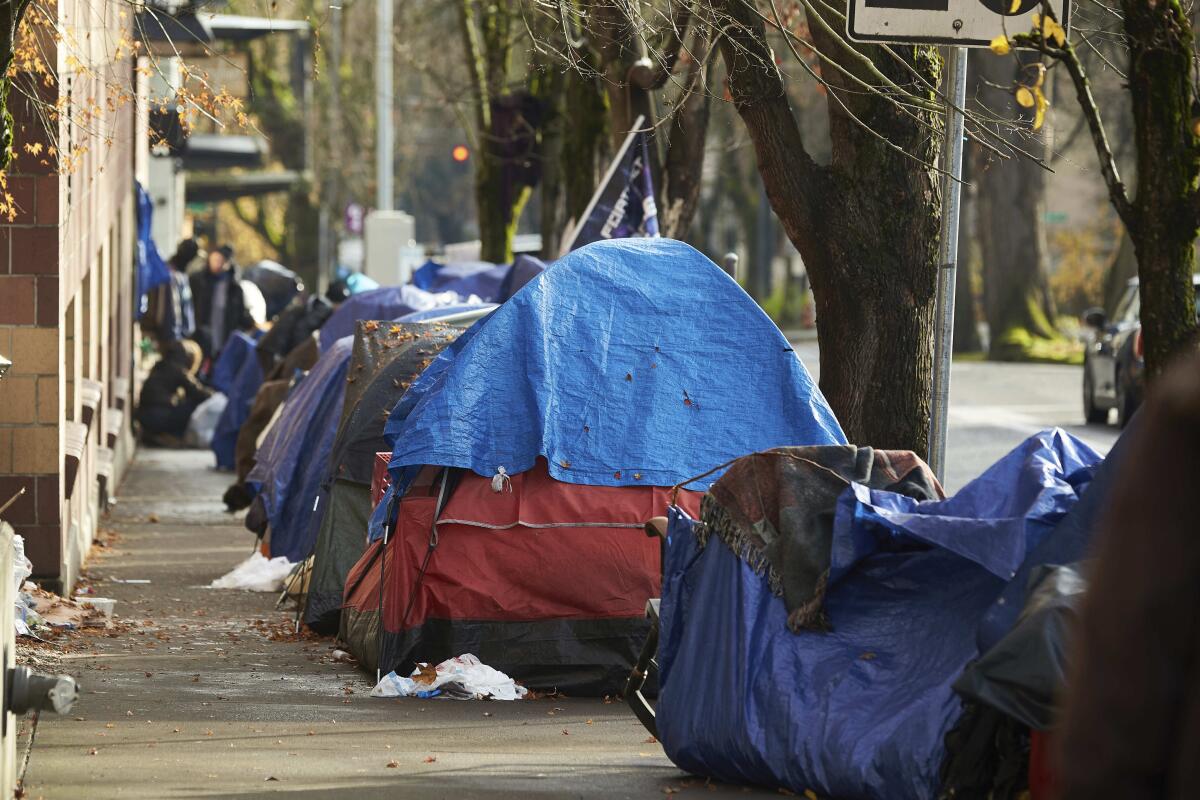Substances fuel record number of deaths among unhoused people in Portland, Ore., area

- Share via
PORTLAND, Ore. — A record 193 homeless people died in Oregon’s Multnomah County, home to Portland, in 2021, a 53% increase from the previous year, according to a new county report released Wednesday.
Substances contributed to about 60% of those deaths, the report found, which mirrored trends seen across the country.
Much like in 2020, methamphetamine was the most common drug noted in the county’s fatalities. But the number of deaths involving fentanyl or a combination of opioids and meth saw the biggest increases.
“Polysubstance, meth and fentanyl are the key takeaways,” said regional health officer Dr. Jennifer Vines, adding that fentanyl use exploded during the pandemic.
“For a long time, we imagined that fentanyl was sort of a drug contaminant that people would kind of stumble upon accidentally, and it would be something that might move through the drug supply,” she said in a news conference. “What we weren’t prepared for was simply the use of fentanyl as a drug that became cheap, that became highly available, and that is so potent and short-acting that people actually develop an addiction and seek out the drug itself.”
The number unhoused people in the county whose deaths involved fentanyl jumped more than eightfold from 2020 to 2021 — from four deaths to 36. Deaths stemming from combined opioid and meth use rose from 27 to 47.
Portland, Ore., long a famously progressive city, faces a crisis of confidence as it grapples with homelessness and crime. Residents can’t agree on solutions.
Meth, however, remained the deadliest drug overall. It was involved in 93 deaths — 82% of substance fatalities — continuing the trend from 2020.
County health officials say they have had difficulty responding to the increase in meth use because there is no medication that can reverse a meth overdose the way that naloxone can reverse an opioid overdose.
“It’s been really hard and really scary,” said Haven Wheelock, program supervisor at Outside In, a Portland-based nonprofit that provides addiction and homelessness services. “For many years, it’s been an uphill battle to have these conversations ... about overdose deaths as the public health crisis that it is, and homelessness as the crisis that it is.”
The report relied on the findings of medical examiners, so the 193 deaths are likely an undercount, county health officials said. Medical examiners generally investigate nonnatural deaths, including those caused by suspicious or unknown circumstances, such as homicide and suicide, and those caused by injuries and accidents, such as overdoses.
The number of unhoused people who died by homicide more than doubled from 2020 to 2021, reaching a new high of 18, or nearly 10% of all homeless deaths. The majority of those homicides involved guns. The increase tracks with a citywide trend in Portland, which has reported record homicides for the last two years amid a surge in gun violence.
Extreme weather events were another factor in the number of homeless deaths, the report found. Four unsheltered people died during the devastating summer 2021 “heat dome,” and eight died of hypothermia during the winter months.
Although 2021 was the first full year of the pandemic, COVID-19 was found to have killed only two homeless people. But the report says that is probably also an undercount, as medical examiners don’t investigate the deaths of people hospitalized for more than 24 hours prior to a natural death. No COVID-19 deaths were identified by medical examiners in 2020.
More to Read
Sign up for Essential California
The most important California stories and recommendations in your inbox every morning.
You may occasionally receive promotional content from the Los Angeles Times.











